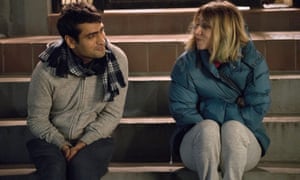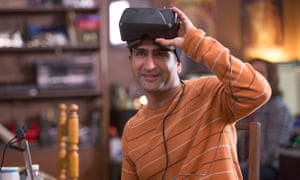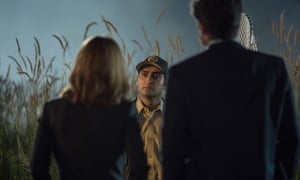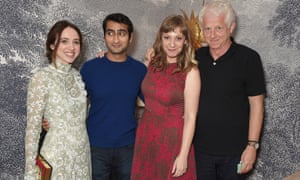The Big Sick's Kumail Nanjiani and Emily V Gordon: 'In America, the idea of a cross-cultural relationship is still controversial' | Film
When Emily V Gordon, then 27 years old, drove to a medical clinic in Chicago she thought she would be in and out in an hour. She had a cold that she couldn’t shift and strange parts of her body ached; she found herself sometimes a little short of breath when she walked. On the way to the clinic, she’d stopped at Wendy’s to buy a Frosty, an ice-cream dessert that was the big treat from her childhood. She thought it would cheer her up, but she left it half-finished in a cup holder.
“I was coming back for that Frosty,†says Gordon a decade on.
But it would sit there for almost a month. A nurse checked Gordon over and her vitals were all over the place. A doctor bundled her into an ambulance. She called her newish boyfriend, Kumail Nanjiani, at midnight and he came straight to the emergency room. The doctors knew Gordon had an infection in her lungs, but they couldn’t work out what was causing it. They wanted to put her in a medically induced coma to find out more, but they urgently needed a family member to sign a release form. “Are you her husband?†a doctor asked Nanjiani, thrusting a pen towards him.
On day eight, after eliminating leukaemia and HIV, the doctors finally realised that Gordon had a rare condition called adult-onset Still’s disease. They operated on her lung and, on day 12, brought her out of the coma. Nanjiani, a standup comedian, had been due to go on tour, opening for Zach Galifianakis, but he kept vigil at Gordon’s bedside with her parents, who had flown in from North Carolina. A couple of months later, in July 2007, he and Gordon were married.
The pair are about to celebrate their 10th anniversary, but one suspects that finding a tasteful tin or aluminium keepsake is not their highest priority right now. Instead, they are marking it with a semi-fictional movie of the early days of their courtship called The Big Sick, which they wrote together and which stars Nanjiani as the Kumail “character†and Zoe Kazan as Emily. The film premiered at the Sundance film festival in January and was snapped up, following a bidding war, by Amazon for $12m. This was big money for an independent film, a significant chunk more than Amazon paid for Manchester by the Sea the previous year. The Big Sick was released in America at the end of June and the New York Times praised Nanjiani and Gordon for “revitalising an often moribund sub-genre with a true story of love, death and the everyday comedy of being a 21st-century Americanâ€. Early indications are that it could become Amazon’s biggest film hit ever. It opens in the UK at the end of the month.
The unlikely story of how The Big Sick came to exist is maybe not as dramatic as the coma episode, but it does have heartwarming moments, too. In 2012, Nanjiani was on a podcast with Judd Apatow, the writer, director and fairy godfather of modern American comedy. Apatow suggested that he and Nanjiani discuss some ideas, something he has done previously with Kristen Wiig (which resulted in Bridesmaids), Lena Dunham (Girls) and Amy Schumer (Trainwreck). Nanjiani came back to him with a handful of pitches: the ones about “aliens and spaceships†didn’t hit the mark, but the story of how he and Gordon got together did.
The couple met in Chicago in 2006, when Gordon came to a standup night at which Nanjiani was performing. He noticed her when she whooped at one point â€" he claimed it distracted him â€" and he picked her up by using a gambit in which he wrote her name in Urdu on a napkin. This is one incident where The Big Sick departs from real life. “In the film, Emily calls him out on it, but in reality I fell for it completely,†says Gordon, who is 38, tall and has a severe fringe and wide, blue saucers for eyes. “So that was me trying to correct my gullible reaction.â€

For Nanjiani, who was raised in Pakistan, the coma was just a jumping-off point; where the story became really emotionally rich was in the cross-cultural aftershocks it created. Gordon’s illness led him to spend two very intense weeks with her parents, whom he’d never previously met. The situation also forced him to confront the fact that his strict Muslim parents were expecting him to have an arranged marriage to a Shiite Pakistani.
But even at the darkest times, there were funny interludes. When Gordon went into a coma, her friends scurried to her apartment to hide her “sex, drugs and rock’n’roll paraphernalia†before her mum and dad showed up. “My parents were aware that I was a grown-up,†Gordon noted, “but no one wants to stumble upon the vibrator of their sick daughter.â€
“I was pretty confident Judd would like it,†admits the 39-year-old Nanjiani, who is handsome, even suave. You might recognise him from Mike Judge’s tech satire Silicon Valley for HBO, in which he plays a coder called Dinesh, who is terrible with women and desperate to be cool, essentially reflecting Nanjiani’s own teenage years. “Because all his stuff is about relationships and it’s all very character-based. And it was messy too, so I knew this was exactly the kind of stuff that he does.â€
Humour, as Mark Twain realised, is tragedy plus time. But as they began to work on the screenplay for The Big Sick â€" initially Nanjiani on his own and then, when he got stuck, joined by Gordon â€" both of them began to appreciate how much that month had changed them. Not long after she left hospital, Gordon wrote an article titled “I was in a coma and it didn’t change me at allâ€. The naivety of that, she says, is now comical.
“Slowly it dawned on me, just going on walks and crying while looking at trees, ‘Oh yeah, I’m fundamentally a different human being now,’†she remembers. “It’s corny and it’s cliched as hell, but I definitely stopped having a lot of fear after this experience. I used to second-guess every decision I’d make, but I just wasn’t scared any more.â€
Nanjiani adds: “What’s the worst that could happen?â€
“Oh, I don’t get the job?†says Gordon. “OK. I was in coma! Come on.â€
Their backgrounds couldn’t be much more different: he was born in Karachi, a metropolis of 27 million that the BBC once called “a city of nightmaresâ€; she was raised in congenial Winston-Salem, North Carolina. But Gordon and Nanjiani are clearly well matched. They both grew up loving video games and comic books and still do. Nanjiani has a weird predilection for British romcoms â€" for a long time he idolised Hugh Grant and grew floppy hair to match â€" but otherwise they basically like the same films. Today, they share a sofa in a London hotel and spend an hour talking over each other. Each delights most in making the other one laugh, which, allegedly, is not always a given with married couples. He perhaps talks a little more, while she is expert at wry quips.
If they have any embarrassment about combing through the intimate details of their relationship they don’t show it. The only question they decline to answer is about the matching tattoos they had done on their wedding day. “We’re pretty private about them,†says Gordon. Nanjiani’s brow furrows: “Though they’re not in a private place,†he says. “They are in a pretty public place.â€
Soon after they were married and, just months after the coma experience, Gordon and Nanjiani upturned their lives: they both quit their day jobs â€" hers as a couples and family therapist, his as an IT drone in an office â€" and left Chicago for New York so that Nanjiani would be better placed to get an agent for standup and find TV work. Gordon laughs: “I don’t know why none of my friends, or my family, was like, ‘Hey Emily, you think maybe this is kind of a weird decision?’ But you have this experience where you almost die and you think, ‘Oh, well, whatever I want, I need to get it now, I want it now.’â€
“And people who knew us were like, ‘Yeah, they should get married,’†Nanjiani recalls. “It didn’t feel like one of those butterflies-in-the-stomach, gooey lovey-dovey things. We’d really been through the fire, together and separately.â€
Around this time, Nanjiani began to make his standup more personal. From Karachi, he had landed aged 19 in the middle of Iowa, having taken a place at Grinnell College to study philosophy and computer science. He first did standup in his final year there and after graduating he moved to Chicago and began performing three or four times a week. But he disliked the idea of being known as “an ethnic comedian†so he preferred to do material about video games or horror flicks. The one time he touched on his background was when he would start a joke: “People always tell me I should do more ethnic material… †He would then chat away for a few seconds in Urdu.
“I love that joke,†says Gordon. “It’s such a punk-rock thing to do: ‘Oh, this is what you want? OK, here you go!’â€
Post coma, however, Nanjiani began to realise that his upbringing was precisely what made him different from other comedians. “After Emily was sick I decided, this is a big part of me that I’m ignoring and I think there’s a way to talk about it in a way that’s personal and true to myself and not stereotypical,†he says. “Not all of them necessarily are Pakistani experiences, but they are just experiences that a lot of people in America could not have had growing up.â€
There’s a good example in Beta Male, a 2013 standup special Nanjiani recorded for Comedy Central. “Most birthdays in Pakistan, a monkey shows up,†he begins, and then pauses when there’s no audience reaction. “All right, the fact you just accepted that is racist.†He stops again for a few seconds; there’s awkward tittering. “But it also does happen. But the fact it makes sense to you: racist… you guys are accurate racists.â€

Gordon and Nanjiani didn’t stay in New York long; they moved to Los Angeles, where they live in Los Feliz with their cat, Bagel, who has his own Twitter feed. When offers of work did not exactly overwhelm them, they made their own creative outlets. They co-hosted a podcast on video games called The Indoor Kids. They also, for many years, curated a weekly standup showcase together in a small room behind a comic-book store in Sunset Boulevard. In 2013, Gordon released a tongue-in-cheek self-help book, Super You: Release Your Inner Superhero.
Before Silicon Valley, which has just completed its fourth series, and The Big Sick, Nanjiani had got a lot of “guy†roles: Gary the Delivery Guy, George the Counter Guy, Showoff Guy, Cable Guy. “Honestly, we didn’t write The Big Sick because we were like, ‘I want to be the star of a movie,’†he says. “And I really liked those ‘guy’ roles, but it wasn’t until this movie that I got to do anything that had any sort of emotional or dramatic component to it. But that’s what Judd is good at. He will have people who haven’t had a shot and make them write it and star in it. Then suddenly people see them differently, which is cool.â€
The writing process for The Big Sick took the best part of four years. While the story is still very much the experience that Nanjiani and Gordon lived through, some elements have been adapted to increase the drama or make the scenes more comic. Apatow and his co-producer, Barry Mendel, demanded rewrite after rewrite, but the result is a tight screenplay that eschews the comforting tropes of the classic romcom. It’s funny, moving, smart and timely; one of the films of 2017, for sure.
“If Judd’s behind you, he’ll be behind you,†says Gordon. “So we never had to worry about studio notes being like, ‘What if Kumail was Brendan Fraser?’ We never had to have those conversations.’â€
The fact that Nanjiani has held on to the lead role is clearly significant, even if Apatow wasn’t explicitly setting out to make that point. Early in his standup career, he would get called “Kumarâ€, a reference to the 2004 stoner comedy Harold and Kumar Go to White Castle, which features an Indian-American actor, Kal Penn. In recent years, that’s been updated to being confused with Asiz Ansari, who was in Parks and Recreation and now stars in Netflix’s Master of None. Nanjiani believes that America is still a long way behind Britain in this respect.
“In Britain, I think the Indian and Pakistani population is a lot more integrated in society and in pop culture,†he says. “You’ll watch a show and one of the cops will just be Indian heritage and it’s not part of it. But in America, if there’s a brown guy in a thing, their brown-ness is part of the character in some way. The idea of a cross-cultural relationship is still a controversial thing.â€
Gordon is not totally sure she agrees. “Inter-racial relationships are not a crazy-new thing in America,†she points out.

“No,†says Nanjiani, chewing this over, “but we haven’t seen a brown guy and a white woman in any movie or TV show. I’m not saying they’re against it, but it’s something they are intrigued by. It is a little bit of a taboo. When there’s a cross-cultural relationship, people from both sides get angry sometimes. I’ve experienced it.â€
Nanjiani and Gordon say that they expected Hillary Clinton to win the presidential election, but Donald Trump’s ascension has created an intriguing climate in which to release the film. “I feel like Islamophobia in America has become so much more vocal and so much more part of the conversation,†says Nanjiani. “And some of the discourse there has gone backwards. Whereas before with certain things you’ll be like, ‘All right, interracial relationships are OK’, that’s assumed, let’s build from that. And now, it’s like, ‘Well, maybe not, maybe an interracial relationship is an attack on whiteness.’ Which is very unfortunate.â€
The movie is not explicitly political but there is a scene in which Nanjiani’s character is heckled during his comedy set: “Go back to Isis,†a frat-boy type jeers. This scene came from personal experience. “I’ve been yelled stuff like that,†says Nanjiani, “not in a while, but when I was first starting out, many, many, many times. By that, I mean eight times and in the beginning I wasn’t able to handle it.â€
“Which makes the audience very uncomfortable,†says Gordon. “It’s hard,†Nanjiani continues, “because they’re on my side, but if I can’t take control of the situation again, they are never going to laugh again. People pity you and then they don’t laugh with you.â€
Nanjiani’s solution in real life and in the film was the same: come up with a killer comeback. “That guy’s right,†he deadpans in The Big Sick. “I am a terrorist. I just do standup comedy on the side, to keep a low profile.†At test screenings pre-Trump, the line would get laughs â€" clearly the heckler is a jerk; now it typically receives laughter and applause â€" the heckler could be their president.
Another near-the-knuckle set-up in the film was invented. When Emily’s parents (played by Ray Romano and Holly Hunter) come to see their daughter in hospital, there are a number of awkward exchanges between them and the fictional Kumail. At one point, the dad asks him ham-fistedly what his “stance†is on 9/11. Kumail looks bewildered before replying: “It was a tragedy. I mean, we lost 19 of our best guys.â€
“Yeah, the 9/11 joke gets the biggest laugh in the movie by a long shot,†says Gordon. “Like ridiculous. We tested it to see how that would feel and I think people see that both the dad character is asking a very inane question and that Kumail is responding from the place he’s in, which is that any time he’s uncomfortable he makes an awful joke. So I think people see it as not like trying to be a shocker, but more that it’s these two characters not being great at communicating with each other.â€

Ultimately, however, The Big Sick is not really out to skewer anyone. Kumail’s family in the film has some uncompromising Muslim beliefs, but they are also funny and caring. Emily’s parents are initially not very accepting of Kumail, but they warm up, too. “We wanted everyone in the movie to be right and wrong,†says Nanjiani. “We wanted it to be messy. We didn’t want it to be so obvious whose side you were on.â€
“There are no bad guys,†says Gordon.
Nanjiani and Gordon have to go. That evening, there is a special screening of The Big Sick and they are being interviewed on stage by the king of the romcom, Richard Curtis. Nanjiani especially makes no attempt to hide how much Curtis’s validation means to him. He has seen Four Weddings and a Funeral at least 50 times; he and Gordon even watched it on their wedding day.
“I think I like Four Weddings more than anyone involved with the movie for sure,†he says. “That seems true, yes, because they’d have to be pretty arrogant to be actually in the film and into it as much as I am. But there’s got to be someone who loves it more than I do… â€
“Maybe you should marry that person,†Gordon sighs.
“No,†replies Nanjiani, giving the idea a moment’s thought, “that would be scary. That would not be good.â€
Nanjiani is slightly mortified that when he met Emma Freud, Curtis’s wife, he couldn’t stop himself quoting Notting Hill at one point. “You have to play it normal, right?†he says, admonishing himself.
Gordon nods. “You can’t reference. Kumail has so many middle-aged boyfriends. He has so many white men he lives and dies by. Like, ‘Oh my God, David Duchovny!’â€
“All right,†Nanjiani says, mock offended.
She smirks: “He like flirts with them, it’s hilarious!â€
“Stop it!†he interjects, a fraction more seriously. “Stop it!â€
Curtis awaits and then, when The Big Sick blows over, Nanjiani and Gordon plan to write something else together. “We haven’t killed each other,†she says and then giggles, “yet.â€
The Big Sick is released on 28 July

0 Response to "The Big Sick's Kumail Nanjiani and Emily V Gordon: 'In America, the idea of a cross-cultural relationship is still controversial' | Film"
Posting Komentar